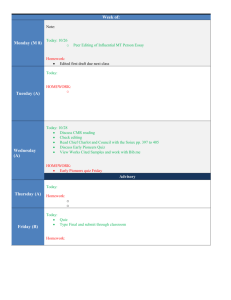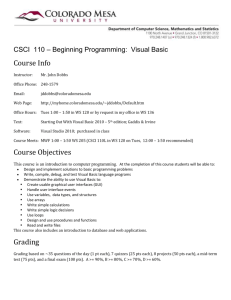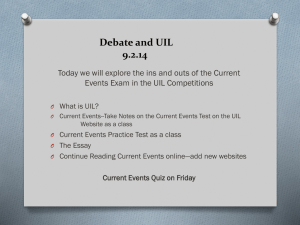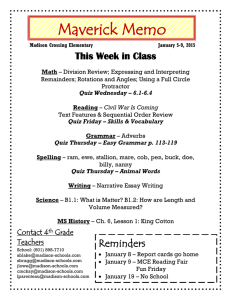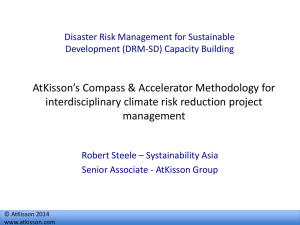This course covers the historical cultural geography of
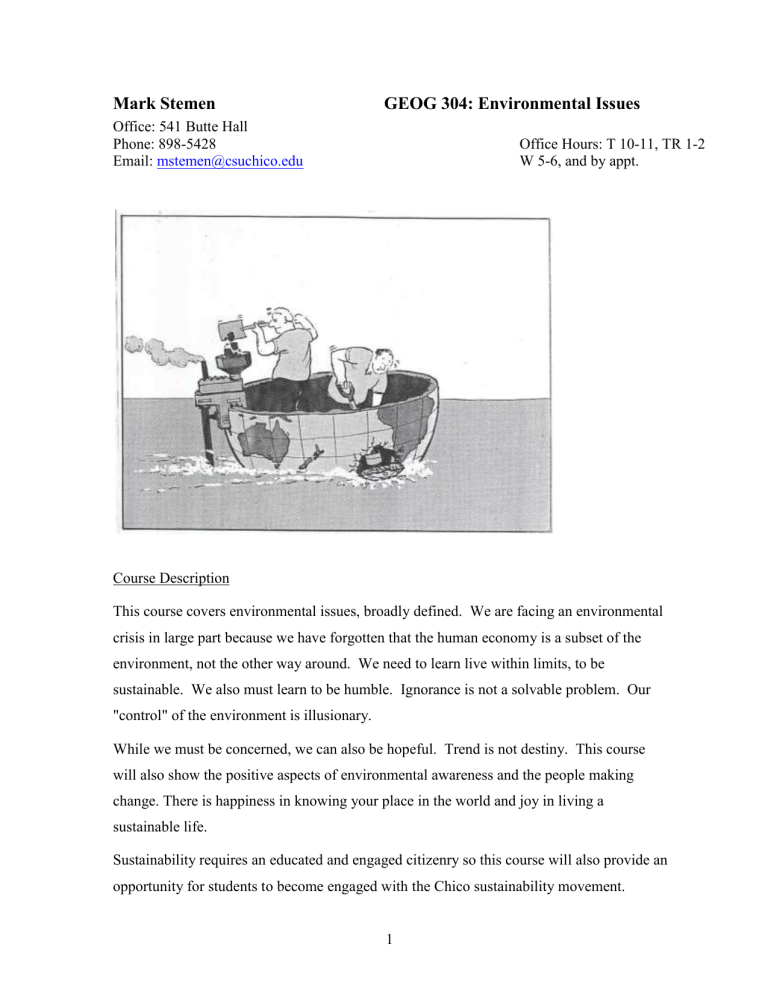
Mark Stemen
Office: 541 Butte Hall
Phone: 898-5428
Email: mstemen@csuchico.edu
GEOG 304: Environmental Issues
Office Hours: T 10-11, TR 1-2
W 5-6, and by appt.
Course Description
This course covers environmental issues, broadly defined. We are facing an environmental crisis in large part because we have forgotten that the human economy is a subset of the environment, not the other way around. We need to learn live within limits, to be sustainable. We also must learn to be humble. Ignorance is not a solvable problem. Our
"control" of the environment is illusionary.
While we must be concerned, we can also be hopeful. Trend is not destiny. This course will also show the positive aspects of environmental awareness and the people making change. There is happiness in knowing your place in the world and joy in living a sustainable life.
Sustainability requires an educated and engaged citizenry so this course will also provide an opportunity for students to become engaged with the Chico sustainability movement.
1
Course Readings
Miller, Sustaining the Earth (edition 8-11)
Quinn, Ishmael
Mr. Copy, GEOG 304 Reader #
Course Objectives
Introduce students to the geographic study of "human/environment relationships"
Introduce students to concepts underpinning modern sustainability
Introduce students to the concept of environmental justice
Introduce students to the social construction of class, race, ethnicity, gender, and other foundational concepts of the dominant culture
Provide students with points of entry to discuss sustainability with their peers
Provide students the opportunity to do something positive and proactive
Provide students the opportunity to improve critical thinking and writing skills
Provide students the opportunity to find their own voice on the issues
Course Requirements
8 quizzes
11 two-page journals
Two-page reflection on volunteer activity
Three-page essay on Ishmael
Four-page essay on sustainability
Three-page final journal
Total
Grade Scale
90% A 80% - B 70% - C 60% - D
160 pts
330 pts
30 pts
200 pts
250 pts
30 pts
1000 pts
2
Course Format
There is a quiz on the textbook almost every week of the semester. I will provide a list of terms the week before the quiz. These quizzes are designed to keep you up on the readings and help you remember the main points.
Acquiring a bunch of facts is not the major focus of this class, however. I am more concerned with how you think about environmental issues, than what you think about them.
I designed the class so we can discuss and expand on the same themes and concepts throughout the semester. Since writing is thinking on paper, we will spend a majority of the class focusing on your written work.
Every week you will write a two-page journal on that week’s assignment. I read these journals, but I do not grade them. If it appears to me that you have done the reading, and spent some time thinking about it, you receive full credit. I assign this exercise to get you into the habit of writing about what you read. Journals are due the week they are assigned.
You will also write two more formal essays throughout the term. These essays will be graded. The first will be on the book Ishmael , by Daniel Quinn. The second will be on sustainability. You complete these essays one step at a time. You can begin writing in your weekly journals. You will write a rough draft, and I and/or your peers will comment on it. (Failure to write a rough draft will result in a thirty-point deduction.) Your final draft is due the following week, allowing you ample time to revise your work before any of it is graded. Additional directions will follow.
This class is a process as much as anything so I expect you to attend every day. But, I realize, things do come up. Everyone is allowed one unexcused absence. After that each subsequent absence will lower your overall total by ten points. Not missing class all semester is hard to do and an effort I wish to reward. So, if you never miss a class, you earn ten points extra credit.
As required, I will also host a culminating event.
If you have a disability of any type that makes it difficult for you to complete any of above the course work please let me know and I will work with you to resolve the difficulty.
3
Weekly reading assignments and course work deadlines
[Lecture topics subject to change]
January 20 – TMI
Syllabus
January 22 – The Campus Microcosm
Video: Campus Ecology
January 27 – Environmental Issues
Paragraph Due
Calculate Your Ecological Footprint [www.myfootprint.org]
January 29 – Sustainability
AtKisson, Future in a Word
Journal #1
February 3– The Triple Bottom Line
Quiz: Chapter 1
Video: Story of Stuff
February 5– Something New Under the Sun
Heinberg, Peak Everything
Journal #2
Saturday & Sunday 2/7&8 – Community Garden Workdays, from 10 to 2
February 10 – Human Population
Quiz: Chapter 4
Video: Changing Education Paradigms
February 12– Campus Sustainability
Uhl, Process and Practice: Creating the Sustainable University
Journal # 3
February 17 – Air Around Us
Quiz: Chapter 12
Video: Bidder 70
February 19 –
Climate Change
McKibben, Global Warming's Terrifying New Math http://www.rollingstone.com/politics/news/global-warmings-terrifying-new-math-
20120719
Journal #4 Due
4
February 24 – Energy
Quiz: Chapters 9 &10
Video: Phantom Hunter
February 26 –
The Long Emergency
Grier, The End of the Industrial Age
Journal #5 Due
March 3 – Food Production and the Environment
Quiz: Chapter 7
March 5 – Agricultural Industrial Complex
Pollan: “An Eater’s Manifesto”
Journal #6 Due (collected at conference)
March 10 – King Corn
Daniel Quinn, Ishmeal
March 12 – King Corn
Daniel Quinn, Ishmeal
March 17 – No Class
March 19 – No Class
March 24 – Mother Culture and the Way Things Came to Be
No Quiz
March 26 – This Way to Sustainability Conference X
**Roll will be taken in the BMU **
March 31 – The Great Forgetting and The Great Remembering
Sahlins, The Original Affluent Society
Eisler, “Journey Into a Lost World”
Rough Draft Due in class
April 2 – Farms of Tomorrow
Shepard, Annual Crops and Civilization
Shepard, Perennial Agriculture
Journal #7 Due
April 7 – Water Resources and Pollution
Quiz: Chapter 8
Video: Big River
April 9 - Making the Transition
Hopkins, What Can Communities Do?
Journal #8 Due
Saturday & Sunday 4/11&12 – Community Garden Workdays, from 10 to 2
5
April 14 – Environmental Hazards and Human Health
Quiz: Chapter 11
April 16 – Transition Towns
Any initiative on http://transitionus.org/initiatives-map
Journal # 9 Due
Essay Due Friday 5pm, Butte 507
April 21 – Urbanization and Waste
Quiz: Chapter 13
April 23– Deep Green Resistance
Jensen, Compartmentalization
Or any article at http://www.orionmagazine.org/index.php/mag/contributor/4698/
Journal #10 due
April 28 – Discussion
Rough Draft Due in class
April 30 – Rising to the Challenge
AtKisson, Accelerate to Survive
Journal #11 due
Saturday, May 2 rd Endangered Species Faire from 11 to 4pm at One Mile in Bidwell Park
May 5 – Idle No More
Film: Just Do It
Reflection Essay and Extra Credit Due
May 7 – We Are Grass
Essay Due Friday 5pm
May 14 – Final Culminating Event
Section 1 @ 10am
Section 2 @ Noon
Final Journal Due
6

